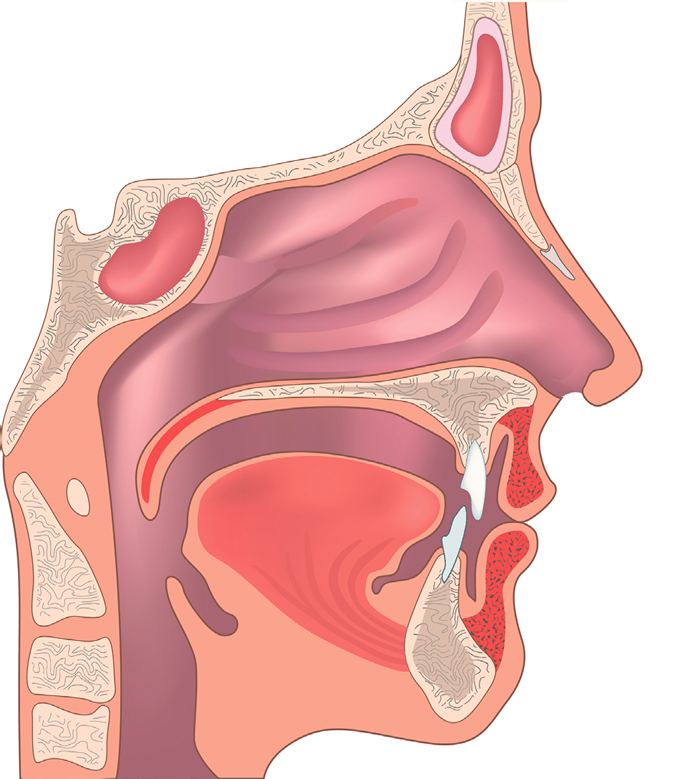Part of eating well is enjoying our food. Changes in the ability to taste and smell can interfere with that joy. Unfortunately, these two senses often diminish with age, which can harm our choices of foods, along with our enjoyment. Acknowledging and addressing changes to taste and smell can help bring pleasure back to the plate.
Taste: There are approximately 8,000 taste buds in the human mouth. These amazing receptors allow us to sense 5 major tastes: sweet, salty, bitter, sour, and umami (savory). A 2017 study of 1,020 Caucasian European participants ages 18 to 80 found that, in general, the intensity of all five tastes diminished with age. Changes in taste can be due to loss of taste buds, decrease in saliva (which helps carry the flavor molecules to the taste buds), medication side-effects, and inability to adequately chew foods to release their flavor. Nerve and brain changes can play a role as well. Interestingly, many complaints of loss of taste are actually caused by dimished sense of smell.
Smell: Taste and smell are closely related. As anyone who has ever tried to eat with a stuffy nose knows, food can taste very different when we can’t smell it. Odors enter the nose both through the nostrils and directly from the mouth to the inner nasal cavity. In the nose, they dissolve in mucus and are carried to odor receptors. The ability to repair or replace damaged odor receptors lessens with age. Limited research suggests that more than one-half of the population between 65 and 80 years old has demonstrable losses in their ability to smell. After 80, losses are thought to affect more than three-quarters of the population. Damage to odor receptors can be caused by air pollution, cigarette smoke, and even viruses and bacteria. Colds and allergies can temporarily block smell, as can benign growths called nasal polyps, and some medications (including many cholesterol and blood pressure drugs) may negatively impact this important sense.
Impact: When we find our food bland, anecdotal evidence suggests that we may instinctively add salt or sugar to increase flavor. Salt intake can raise blood pressure, which increases risk for heart attack and stroke. Too much added sugar is associated with weight gain and type 2 diabetes. More importantly, food can lose much of its appeal when it doesn’t taste good. This diminished enjoyment of food can lead to eating less, which in turn can cause unintended weight loss or even malnutrition later in life.
Disturbances to taste and smell can significantly influence not only dietary quality and enjoyment, but also safety, such as not being able to smell the smoke from a fire or gas from a leaking stove, or to tell when food has gone bad. These changes can also indicate neurological problems, so it’s important to tell your doctor if you notice any changes with your senses of taste and smell.
Short term/Modifiable
-Cold or allergy
-Nasal polyps
-Medications that alter taste or lead to dry mouth (including antibiotics and drugs for treatment of high -cholesterol and high blood pressure)
-Radiation, chemotherapy, and other cancer treatments
-Poor dental hygiene
-Ill-fitting dentures
Long term
-Damage to taste buds or odor receptors
-Decline in number of taste buds or odor receptors with age
-Smoking
-Excessive alcohol use
-Head injury
-Neurologic changes (including Parkinson’s and Alzheimer’s disease)
-Dry mouth from chronic medical condition
Take Charge!
If you find your food doesn’t taste the way you remember, or your sense of smell is waning, try these tips:
-See your doctor or an otolaryngologist (ENT, or “ear, nose, and throat” doctor). Get screened for health conditions (like nasal polyps or neurologic diseases) that could be causing changes to taste or smell. Discuss changing medications if you take something known to impact taste or cause dry mouth.
-Check with your dentist if poor dental health or ill-fitting dentures are impacting chewing.
-Put down the salt shaker and use herbs and spices to add flavor to foods. Lemon and lime juice are also known to kick flavor up a notch. Cook with strong flavors like onions and garlic, and try hot sauce or chili peppers if you enjoy spicy food!
-Vary the color and texture on your plate. Appearance and mouthfeel are also important to the enjoyment of food.
























